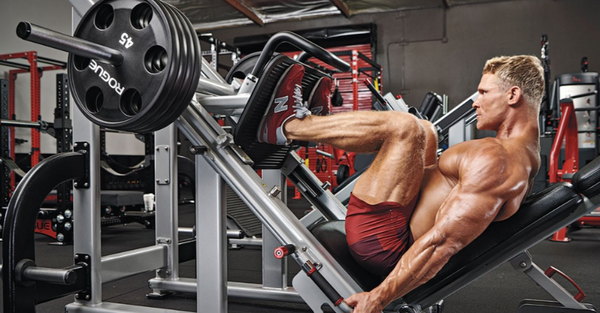7 Ways to Boost Recovery Post-Workout

“Muscles don’t grow in the gym”, as the old saying goes.
Well, there’s truth to it.
Weightlifting alone doesn’t make your muscles bigger and stronger. What happens after the workouts matters too.
The opportunity for muscle growth begins the moment you stop lifting, and that growth can't happen without proper recovery. Muscles don't grow in the gym; they grow after.
When you lift heavy, muscles suffer microtears. Immediately after you lift, your body goes to work repairing those tears and tries to rebuild the muscle fibers bigger, thicker, and stronger -- but it needs your help.
That’s why the work that your body does to repair the stress and damage caused by training is just as important as the work you do in the gym.
Recovery happens effortlessly when we’re kids. We would play, sprint, bike, climb, and jump off the highest stuff we could find, and we were down to do it day in and day out – who even heard of a “rest day” until adulthood?
But as we grow, recovery becomes a process we must play an active role in.
Great recovery is the key to crushing a workout, hitting the sack, and then waking up feeling energized, loose, and ready to kill it all over again.
The bottom line is if you’re not maximizing recovery from your workouts, you’re not gaining muscle and strength as fast as you could be. Here are seven tips to get you recovering like a pro.
1. Consume protein before bed.
Barring a serious case of sleepwalking, we’re not usually giving our body nutrients while we sleep. Consuming a light, protein-rich snack before bed provides our bodies with the raw materials they need to keep repairing muscles overnight. Don’t want to live on protein shakes alone? Here are some high-protein, real foods to try.

2. Drink lots of water.
Better recovery could be just a glass (or two, or three…) away. Exercising while dehydrated can cause greater damage to muscles and reduce the body’s ability to repair itself. Additionally, when on a high-protein diet, your body requires even more water to function optimally.
Sometimes the simple advice is the best advice -- stay hydrated during and after training.

3. Get more sleep.
Multiple studies suggest sleep deprivation can have significant negative effects on performance and recovery. Sleep is also prime time for the body to undergo protein synthesis, so getting extra zzzs after a tough workout might make for stronger muscles and better endurance.
Need another reason? Just one extra hour of sleep can lead to significant increases in testosterone.

4. Eat Potassium-Rich Foods
Consider including a source of potassium in your post-workout cocktail. Your potassium reserves will inevitably be sapped from an intense workout session. Potassium, among other nutrients like sodium and calcium, is a key mineral which plays a role in muscle function.
Bananas are a good source of potassium. They can be tossed into a blender with pretty much anything to make a good protein shake too. As a bonus, if the bananas are frozen, they give the shake a thicker, colder, milkshake consistency.
Want another source of potassium that’s super cheap and can be easily added to most meals? While bananas get all the love, potatoes actually got ‘em beat. A single potato provides almost twice as much potassium as a banana.

5. Reduce Your Stress
Acute stress—like the kind you create from exercise—is a good thing.
However, chronic stress from sources like work deadlines, bad relationships, or inadequate sleep can wreak havoc on how you feel, how well you train, and how quickly you recover.
Too much stress can drastically delay or even prevent recovery by messing with your biochemistry, no matter how tough you are. Stress literally throws your hormones out of balance.
Persistent stress decreases the level of anabolic (muscle-building) hormones like testosterone and increase the level of catabolic (muscle-breakdown) hormones like cortisol.
The improper testosterone/cortisol ratio that stress causes makes it harder to recover and increases your risk of injury.
There’s no way around it. Chronic stress is going to take a toll on your overall well-being and your body's capacity to take on anything further.
Take steps to reduce your stress level to ensure you can bounce back faster. Do something you really enjoy, turn off the news, make yourself laugh, and surround yourself with good people.

6. Eat Enough (Healthy) Calories
People often think that calories only count when you’re talking about weight loss.
What they don’t realize is that calories fuel every process in your body, and the processes related to muscle growth are calorically expensive.
If you don’t eat enough, your body can’t function as efficiently or as quickly.
There’s an old bodybuilder saying: “There’s no such thing as over-training – just under eating and under sleeping!!”
And there’s some truth to that.
Research overwhelmingly shows that when you’re in a calorie deficit (regularly eating fewer calories than you’re burning), your body’s ability to repair and grow muscle tissue is impaired.
Bear this in mind if you’re dieting and need to purposefully under-eat for a while – you may have to budget an extra rest day in there.
If you want to maximize muscle recovery, then you need to make sure you aren’t in a calorie deficit.
The best way to do this is to deliberately eat a bit more calories than you’re burning every day (be in a calorie surplus). This ensures that your body has all the energy it needs to push hard in the gym and fully recover from your workouts.
“Sounds great. So how many calories do I need?”
That depends on your bodyweight and your goal – for example, bulking up vs. cutting down.
If you’re up for trying to track things down to the calorie, there are some nifty calorie calculators out there to figure out exactly what you should be aiming for.
However, to be frank, most of the good ones are so complicated that 90% of people come up with a number that’s wildly inaccurate.
While you can always google ‘calorie calculator’ and try for yourself, we offer some general targets to shoot for that are probably more dialed in.
The daily calorie levels below are broken down by goal and current bodyweight.
We couldn't do every imaginable weight of course, so just pick the one closest to your current size to get a sense of how many daily calories you're aiming for.

It’s important to remember that calories aren’t everything, but they’re a good guideline, especially if you’re just starting out.

7. Supplements
We saved this one for last because supplements aren’t a “quick fix” or a way to skip doing things the right way – as the name implies, they’re intended to ‘supplement’ everything you’re already doing.
But once you’ve incorporated most or all of the tips above, there are some solid supps that can help you take things to the next level.
Creatine:
A recent study at Baylor University found men who took creatine regained their strength faster after doing a series of leg presses, curls and extensions.
Another study looking at muscle damage/repair found creatine did not speed the healing process.
What gives?
Creatine probably isn’t repairing muscle any faster, but it helps refuel muscles between workouts to get them ready for the next day’s grind. It may not technically be boosting recovery, but it’s close enough.
If you go this route, here are some tips to make creatine even more effective, as well as everything you’ll want to know about this supplement staple.
Ashwagandha:
Also known as Withania Somnifera, Winter Cherry, and Indian Ginseng, Ashwagandha is an herb that belongs in every athlete’s bag of tricks.
Ashwagandha naturally (and safely!) boosts testosterone, increases protein synthesis, and can even reduce feelings of stress and anxiety.
There are two common, standardized forms of this herb: KSM-66 and Sensoril. KSM-66 seems to be better for strength, muscle, and athletic performance, while Sensoril has the edge in reducing stress.
Get a product that is just KSM-66 and take two 250 mg doses per day (morning and evening).
Bonus: it’s extremely affordable. Quality KSM-66 Ashwagandha products can be found for less than 10 bucks a bottle.
Pantothenic Acid:
Pantothenic Acid enables the testes to produce testosterone – which if we haven’t said it enough already, is vital for muscle building and recovery.
Even better, Pantothenic Acid helps your connective tissues repair faster. It’s easy to get so caught up working on muscle that we neglect the tendons and ligaments that anchor those muscles and keep ‘em working right.
Octacosanol:
Octacosanol is a rare, straight-chain aliphatic primary fatty alcohol found in trace amounts on sugar cane leaves – and it has a broad range of benefits for recovery.
Octacosanol restores and optimizes the Testosterone : Cortisol ratio. If that sounds familiar, it’s because it was mentioned earlier -- an unfavorable T to C ratio is a key diagnostic indicator that someone is over-trained, under-recovered, or experiencing chronic stress.
Athletes with poor T to C ratios will feel sluggish and see their gains to slow to a crawl.
Octacosanol tackles this problem head-on and tilts the scales back in favor of muscle, drive, and strength.
Additionally, Octacosanol reduces feelings of stress and improves sleep quality.
Finally, Octacosanol helps repair, insulate, and strengthen the nerves that connect your mind to your muscles (also known as the Central Nervous System, or CNS).
Consistent, heavy weight-training taxes the CNS tremendously. CNS Fatigue is a real problem among athletes and is considered the single most neglected area of recovery.
CNS Fatigue reduces strength and coordination, slows reaction time, and increases risk of injury across the board.
Don’t let CNS Fatigue hold your workouts back. Address it with the combo of Octacosanol plus quality rest. Your body will thank you for it.
Bonus: Octacosanol’s positive effects for strength athletes don’t stop at boosting recovery. It’s been shown to increase strength, accelerate muscle-building, boost endurance, and help muscles burn more fat. Here’s everything you need to know about Octacosanol.
We included the optimal dosages of both Pantothenic Acid and Octacosanol (and a whole lot more) in our pre-training product, UNTAPPED.
The Bottom Line on Recovery
If you’re serious about building a great body, then you’ll be subjecting it to a lot of intense workouts.
No way around it.
You’ll also have to make sure that your body can recover from those workouts and be ready for the next day of training.
Follow the simple steps outlined above and you’ll recover better than ever before.
And that will translate into faster gains than ever before.
Give them a try and see for yourself!
Also in News

The Truth About the Leg Press

What Builds More Muscle: Chicken or Beef?





